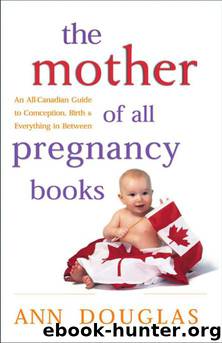8160.The Mother of All Pregnancy Books An All-Canadian Guide to Conception, Birth and Everything in Between by Ann Douglas

Author:Ann Douglas [Douglas, Ann]
Language: eng
Format: epub
Published: 0101-01-01T00:00:00+00:00
t h e c o m p l a i n t d e p a r t m e n t
2 7 9
th week of pregnancy, you may experience some extreme ten-
derness in the belly button area. This is caused by the pressure
of the expanding uterus on your belly button. The tenderness
tends to subside as your belly grows, so this is one thing you can
strike off the complaint list sooner rather than later.
Bleeding gums
Even if you’re not usually a card-carrying member of the Inter-
national Order of Daily Flossers, you might want to think about
taking out a membership for at least the duration of your preg-
nancy. Pregnant women often develop a condition called preg-
nancy gingivitis, characterized by inflamed and sensitive gums
that bleed more easily than usual. In addition to flossing daily
and brushing your teeth after every meal using a gentle-bristled
toothbrush, you should plan to take the following steps to min-
imize pregnancy gingivitis:
• See your dentist at least once during your pregnancy. Having
the buildup of plaque that collects at the bottom of your teeth
scraped off can help to reduce the severity of your symptoms.
• Rinse your mouth with antiseptic mouthwash several times a
day. That will help to keep your mouth sparkling clean.
• Choose foods such as fruit and vegetables that are rich in vit-
amin C—something that helps to promote healthy gums.
F A C T S A N D F I G U R E S
Don’t be alarmed if you develop tiny nodules on your gums that
tend to bleed easily. These nodules—known as pyogenic granulomas (pregnancy tumours)—are harmless, non-cancerous growths. They usually dis-
appear on their own after you give birth, but if they’re causing you a lot of grief in the meantime, your dentist can remove them.
2 8 0
t h e m o t h e r o f a l l p r e g n a n c y b o o k s
Bleeding and spotting
Any type of vaginal bleeding can be worrisome during pregnancy,
but sometimes the light bleeding or spotting you experience is
completely harmless and not a symptom of an impending mis-
carriage. About seven days after conception (when you’re three
weeks pregnant, counting from the first day of your last men-
strual period), you may experience a bit of light bleeding or spot-
ting as the fertilized embryo first implants itself in the uterine wall
(“implantation bleeding”). Light bleeding can also occur if the
cervix happens to get bumped during intercourse or accidentally
grazed during a pelvic exam. While you should always report any
vaginal bleeding or spotting to your caregiver, there’s generally less
cause for concern if the bleeding is very light (unless, of course,
you’re experiencing cramping at the same time, in which case you
could be experiencing a miscarriage or placental abruption, or if
you have developed placenta previa). (See Chapter for a more
detailed discussion of bleeding during pregnancy.)
Braxton Hicks contractions
This is the name given to the irregular contractions that occur
during the last half of pregnancy. (Just a quick bit of pregnancy
trivia: The contractions are named after John Braxton Hicks,
M.D., the British doctor who first described them back in .
Download
This site does not store any files on its server. We only index and link to content provided by other sites. Please contact the content providers to delete copyright contents if any and email us, we'll remove relevant links or contents immediately.
Name Book, The: Over 10,000 Names--Their Meanings, Origins, and Spiritual Significance by Astoria Dorothy(2978)
Tone Your Tummy Type by Denise Austin(2836)
The Ultimate Guide to Anal Sex for Women by Tristan Taormino(2287)
The Expectant Father by Armin A. Brott & Jennifer Ash(2269)
The Coregasm Workout by Debby Herbenick(2267)
The Women's Health Fitness Fix by Jen Ator(2230)
Expecting Better by Emily Oster(2209)
She-ology by Sherry A. Ross MD(2158)
The Hite Report on Shere Hite by Shere Hite(2060)
Woman: An Intimate Geography by Natalie Angier(1933)
8 Steps to Reverse Your PCOS by Fiona McCulloch(1909)
Birth by Tina Cassidy(1901)
The Female Brain by M.D. Louann Brizendine(1898)
101 Get-Lean Workouts and Strategies by Muscle & Fitness(1848)
Women & the Weight Loss Tamasha by Diwekar Rujuta(1787)
50 Ways to Soothe Yourself Without Food by Susan Albers(1780)
The Big Booty Blueprint: Your Guide To A Bigger Butt In Less Than 12 Weeks by Bella Rahbek & Brandon Carter(1665)
The overachievers by Robbins Alexandra(1576)
Unleash the Power of the Female Brain: Supercharging Yours for Better Health, Energy, Mood, Focus, and Sex by Daniel G. Amen M.D(1567)
